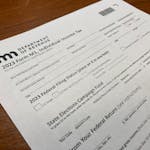A language virus, rampant in our culture, may not be deadly, but it fogs the mind and conveys a meaning contrary to what a writer intends.
Flash back to almost two weeks ago, when the top story in the national news was the car crash that almost cost Tiger Woods his life. His car went out of control, left the road and rolled over, leaving him trapped inside the wreckage.
Now consider this sentence, delivered by a veteran reporter for the flagship newscast of a major TV network:
"Showing no signs of impairment, firefighters used an ax to extract him."
That sentence says firefighters showed no signs of impairment.
In fact, the sheriff said it was Woods who showed no signs of impairment, meaning that he appeared to have neither alcohol nor drugs in his system.
How did the reporter create this confusion? By compressing two distinct facts — Woods' non-impairment and firefighters' freeing him from the car.
The reporter knew what he meant to say, but he (and his editor, if he had one) did not make sure that the sentence said what it meant.
That error is one of the most common in modern communication. Far better for the reporter to have said, "Firefighters used an ax to extract Woods, who the sheriff said showed no signs of impairment from alcohol or drugs."
A classic form of this error: "Raised in Edina, her unbeaten streak in tennis has lasted 20 years." No. Her streak was not raised in Edina; she was. If you start a sentence with, "Raised in Edina," the next word must identify that person.
One way to avoid the error: read aloud what you have written, but that's no guarantee.
Better yet: learn and practice the principles of clarity. A great place to start: William Zinsser's book "On Writing Well."
Imprecision can cause confusion, and — in any endeavor — confusion can cause disaster.
If you read or hear this kind of error, please send it to me, so that I can share your keen observation with kindred spirits.
Gary Gilson is a Twin Cities writing coach and Emmy Award winner. He also teaches journalism at Colorado College. Gilson can be reached through his website writebetterwithgary.com.




